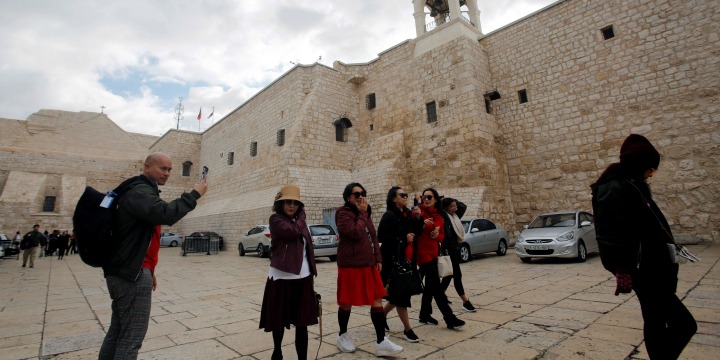RSS
How the Media Blamed Israel for Ruining Bethlehem’s Christmas (Again)

Tourists walk in Manger Square outside the Church of the Nativity in Bethlehem, Dec. 2, 2019. Photo: Reuters / Mussa Qawasma.
Once again, it’s that time of the year. But we won’t repeat the obvious: the media love blaming Israel for ruining Christmas in Bethlehem.
We will, however, point at the strategy they use to achieve this.
Here is the issue: The media need to cover what they see. And in Bethlehem, they see a baby Jesus doll placed in rubble; no foreign tourists; and protests in solidarity with Gaza. It is undoubtedly a somber Christmas in Jesus’ traditional birthplace, and it should be reported.
But the media should and can apply critical thinking in their choice of interviewees and background material. And they are not doing so.
The Only Priest in Bethlehem?
The media star of the season, except for Jesus, was (again) Munther Isaac, a pastor at Bethlehem’s Lutheran Church.
Outlets like Reuters, BBC, ABC News, and NBC News were happy to quote Isaac for a simple reason: His church was responsible for the media stunt showing baby Jesus as a Palestinian child amid Gaza rubble.
Fair enough. But nowhere did these outlets mention that Isaac has also justified the October 7 massacre, and has been described as “the high priest of antisemitic Christianity.”
Respected news outlets should not fall prey to the manipulations of one priest. Professional coverage should have bothered to contrast his view with that of other voices in the local Christian community.
But the problem runs deeper. These media outlets rely on Palestinian producers in Bethlehem who would never undermine — out of fear or bias — this anti-Israeli narrative. And their foreign bosses would not dare question their work, because they need their connections.
Selective Background
More proof of the media’s seasonal bias against Israel can be gleaned from the background information provided in certain stories.
Instead of reminding news consumers about the Palestinian Authority’s responsibility for the dwindling numbers of local Christians, many outlets include lengthy background paragraphs about Israel’s occupation of the West Bank.
In Reuters‘ story, for example, a whole section is dedicated to Israel’s settlement activity. One exceptionally irrelevant passage reads:
Israel has built Jewish settlements, deemed illegal by most countries, across the territory. Israel disputes this, citing historical and biblical ties to the land. Several of its ministers live in settlements and favour their expansion.
Similarly, the AP’s “Christmas in Bethlehem” photo collection includes a picture of the security barrier that partially surrounds the city, as a man just happens to walk past graffiti that reads: “Walls are meant for bombing.” Never mind that this wall stood there when Bethlehem enjoyed crowded and celebratory holiday seasons.

And let’s not forget that this bias is not limited to the Christian holidays. Every holiday celebrated by Palestinians in the region — from Ramadan to Easter — gets automatically evaluated based on Israel’s actions.
It never works the other way around, making it seem that Palestinians bear no responsibility whatsoever. For example, the media never outright blamed Hamas for ruining the Jewish holiday of Simchat Torah, which was deliberately chosen as the date for the October 7 massacre.
For the media, it seems, the “oppressed” Palestinians are granted automatic virtue, while the Israeli “oppressors” are seen as innately evil. The holiday season is just another opportunity to show it.
The author is a contributor to HonestReporting, a Jerusalem-based media watchdog with a focus on antisemitism and anti-Israel bias — where a version of this article first appeared.
The post How the Media Blamed Israel for Ruining Bethlehem’s Christmas (Again) first appeared on Algemeiner.com.
RSS
After False Dawns, Gazans Hope Trump Will Force End to Two-Year-Old War

Palestinians walk past a residential building destroyed in previous Israeli strikes, after Hamas agreed to release hostages and accept some other terms in a US plan to end the war, in Nuseirat, central Gaza Strip October 4, 2025. Photo: REUTERS/Mahmoud Issa
Exhausted Palestinians in Gaza clung to hopes on Saturday that US President Donald Trump would keep up pressure on Israel to end a two-year-old war that has killed tens of thousands and displaced the entire population of more than two million.
Hamas’ declaration that it was ready to hand over hostages and accept some terms of Trump’s plan to end the conflict while calling for more talks on several key issues was greeted with relief in the enclave, where most homes are now in ruins.
“It’s happy news, it saves those who are still alive,” said 32-year-old Saoud Qarneyta, reacting to Hamas’ response and Trump’s intervention. “This is enough. Houses have been damaged, everything has been damaged, what is left? Nothing.”
GAZAN RESIDENT HOPES ‘WE WILL BE DONE WITH WARS’
Ismail Zayda, 40, a father of three, displaced from a suburb in northern Gaza City where Israel launched a full-scale ground operation last month, said: “We want President Trump to keep pushing for an end to the war, if this chance is lost, it means that Gaza City will be destroyed by Israel and we might not survive.
“Enough, two years of bombardment, death and starvation. Enough,” he told Reuters on a social media chat.
“God willing this will be the last war. We will hopefully be done with the wars,” said 59-year-old Ali Ahmad, speaking in one of the tented camps where most Palestinians now live.
“We urge all sides not to backtrack. Every day of delay costs lives in Gaza, it is not just time wasted, lives get wasted too,” said Tamer Al-Burai, a Gaza City businessman displaced with members of his family in central Gaza Strip.
After two previous ceasefires — one near the start of the war and another earlier this year — lasted only a few weeks, he said; “I am very optimistic this time, maybe Trump’s seeking to be remembered as a man of peace, will bring us real peace this time.”
RESIDENT WORRIES THAT NETANYAHU WILL ‘SABOTAGE’ DEAL
Some voiced hopes of returning to their homes, but the Israeli military issued a fresh warning to Gazans on Saturday to stay out of Gaza City, describing it as a “dangerous combat zone.”
Gazans have faced previous false dawns during the past two years, when Trump and others declared at several points during on-off negotiations between Hamas, Israel and Arab and US mediators that a deal was close, only for war to rage on.
“Will it happen? Can we trust Trump? Maybe we trust Trump, but will Netanyahu abide this time? He has always sabotaged everything and continued the war. I hope he ends it now,” said Aya, 31, who was displaced with her family to Deir Al-Balah in the central Gaza Strip.
She added: “Maybe there is a chance the war ends at October 7, two years after it began.”
RSS
Mass Rally in Rome on Fourth Day of Italy’s Pro-Palestinian Protests

A Pro-Palestinian demonstrator waves a Palestinian flag during a national protest for Gaza in Rome, Italy, October 4, 2025. Photo: REUTERS/Claudia Greco
Large crowds assembled in central Rome on Saturday for the fourth straight day of protests in Italy since Israel intercepted an international flotilla trying to deliver aid to Gaza, and detained its activists.
People holding banners and Palestinian flags, chanting “Free Palestine” and other slogans, filed past the Colosseum, taking part in a march that organizers hoped would attract at least 1 million people.
“I’m here with a lot of other friends because I think it is important for us all to mobilize individually,” Francesco Galtieri, a 65-year-old musician from Rome, said. “If we don’t all mobilize, then nothing will change.”
Since Israel started blocking the flotilla late on Wednesday, protests have sprung up across Europe and in other parts of the world, but in Italy they have been a daily occurrence, in multiple cities.
On Friday, unions called a general strike in support of the flotilla, with demonstrations across the country that attracted more than 2 million, according to organizers. The interior ministry estimated attendance at around 400,000.
Italy’s right-wing government has been critical of the protests, with Prime Minister Giorgia Meloni suggesting that people would skip work for Gaza just as an excuse for a longer weekend break.
On Saturday, Meloni blamed protesters for insulting graffiti that appeared on a statue of the late Pope John Paul II outside Rome’s main train station, where Pro-Palestinian groups have been holding a protest picket.
“They say they are taking to the streets for peace, but then they insult the memory of a man who was a true defender and builder of peace. A shameful act committed by people blinded by ideology,” she said in a statement.
Israel launched its Gaza offensive after Hamas terrorists staged a cross border attack on October 7, 2023, killing some 1,200 people and taking 251 people hostage.
RSS
Hamas Says It Agrees to Release All Israeli Hostages Under Trump Gaza Plan

Smoke rises during an Israeli military operation in Gaza City, as seen from the central Gaza Strip, October 2, 2025. Photo: REUTERS/Dawoud Abu Alkas
Hamas said on Friday it had agreed to release all Israeli hostages, alive or dead, under the terms of US President Donald Trump’s Gaza proposal, and signaled readiness to immediately enter mediated negotiations to discuss the details.


